2024 Capstone Award Winners
On October 18, the Boston University College of General Studies celebrated the outstanding students who received awards for the Capstone projects they completed last May. The Capstone project is a 50-page research paper that CGS students complete during their sophomore year. Students draw on two years of interdisciplinary studies, working as a team to synthesize data into a meaningful whole—making a proposal or reaching a verdict and justifying their conclusions through their research. The Capstone award is given annually to the group of students who present the best overall Capstone paper and defense on each team. It is the highest honor bestowed upon a College of General Studies student for an academic project. Below, we highlight why each winning group was chosen, in the words of their faculty.
Team S: Boston University Advocates for the Issue of Homelessness: Analyses and Policy Proposal
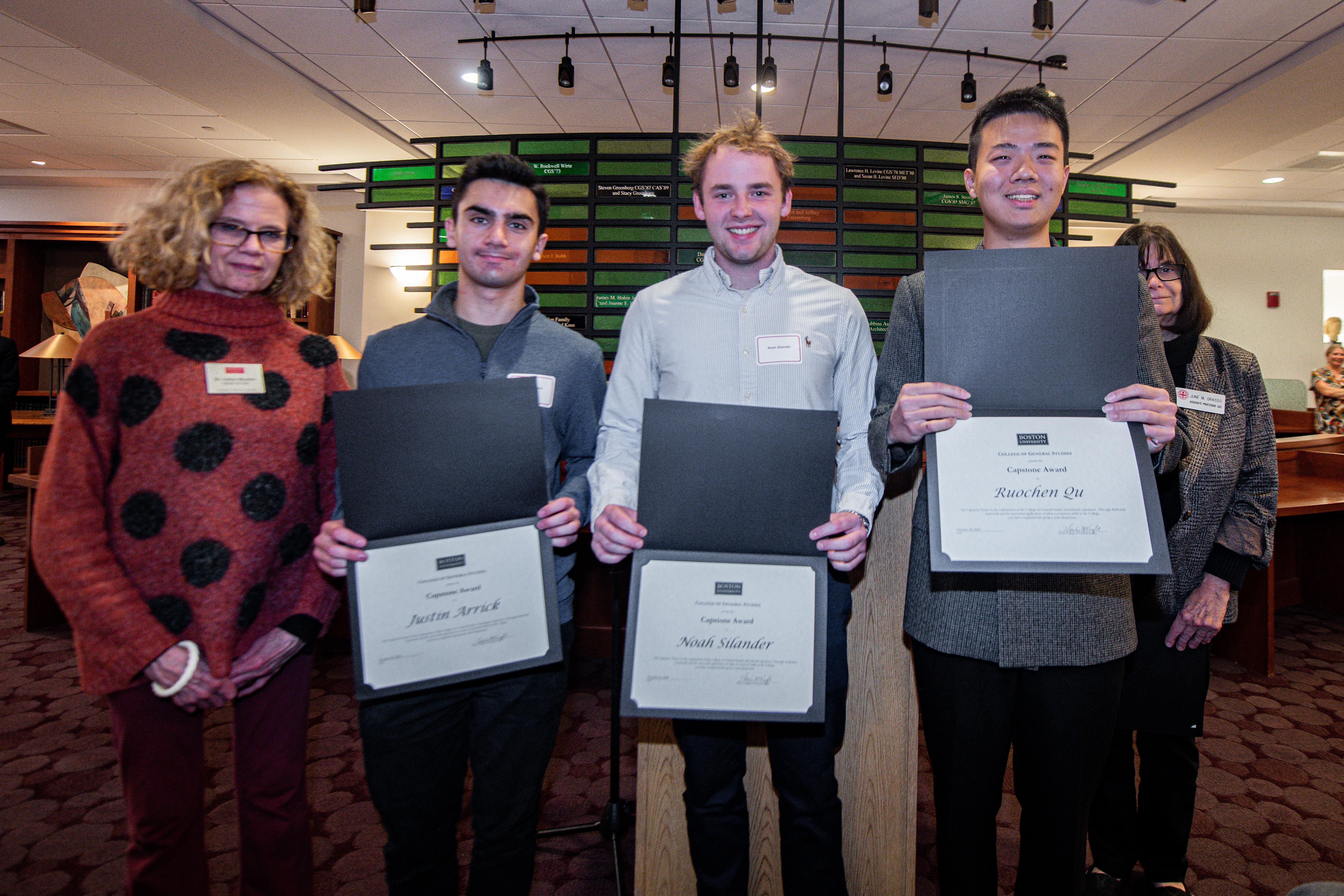
The winning Capstone group for Team S (Justin Arrick, Ruochen Qu, Noah Silander, Zhihe Tian, Natalie Torres-Robinson, Xinyan Yao, Jiyoon Yun, Minjie Zuo) focused on tackling the issue of homelessness. The members constituted themselves as a non-profit organization focused on Massachusetts, especially the Boston area. Their proposal, addressed to the state legislature, covered the controversial issues facing the Healey administration today. The group offered creative new solutions—plus some that have already had some success—expanded sources for funding, and tackled controversial issues such as the push for increased housing density for areas surrounding Boston. The faculty were particularly impressed with the thoroughness and breadth of research. The group used an interdisciplinary approach, focusing on the history, economics, politics, and ethics of the homelessness problem. Their empathy was evident in every policy position; their intellectual sophistication reflected in the document’s finely detailed and fluid prose; their graceful teamwork reflected in the respect with which they regarded each other, making the oral defense satisfying, rewarding, and intellectually stimulating.
Team T: S.A.F.E Public Defense: A Comprehensive Analysis of Mississippi’s Public Defender Crisis
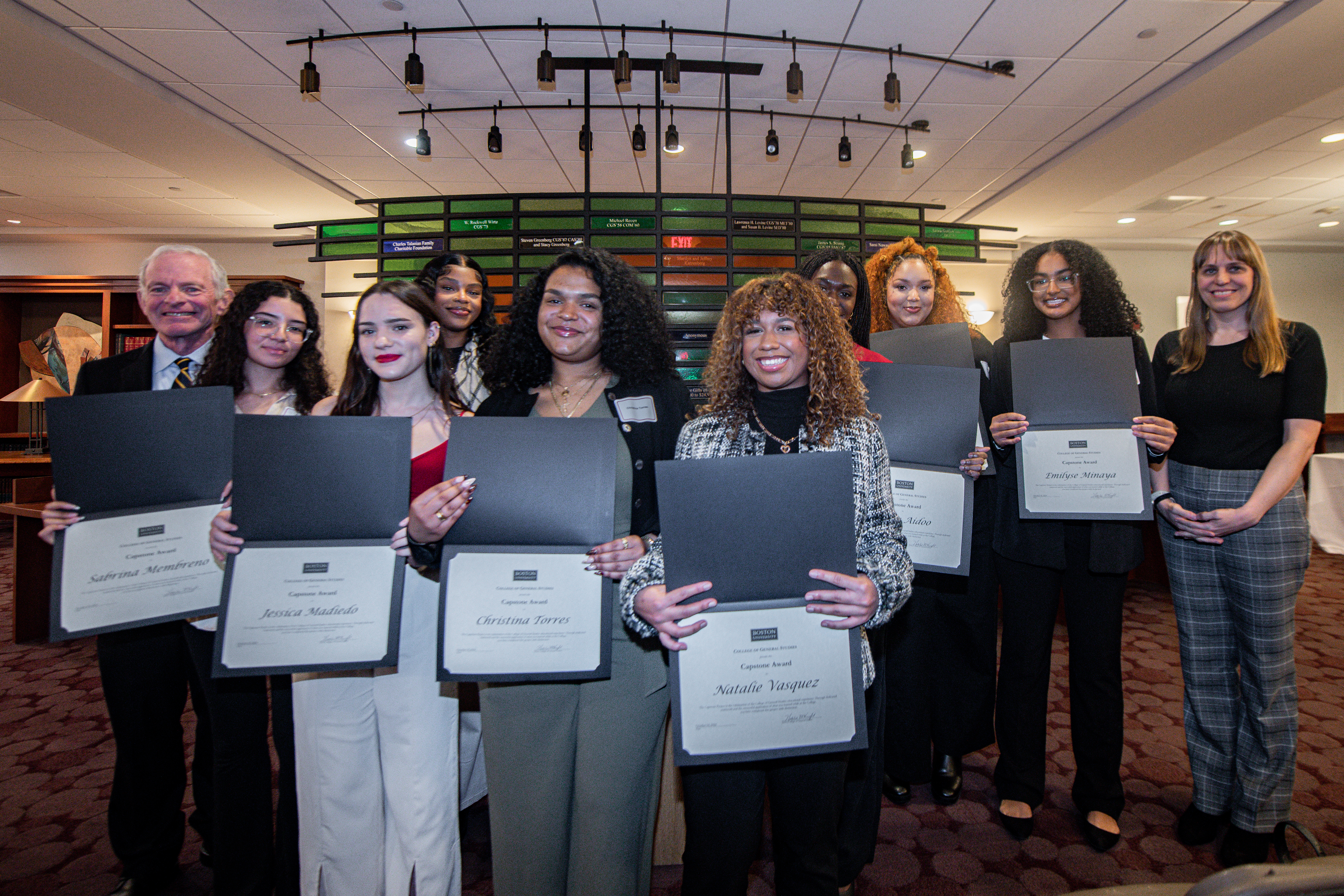
Team T’s winning Capstone group (Araba Aidoo, Janelle Cerene, Emilie Jimenez, Jessica Madiedo, Sabrina Membreno, Emilyse Minaya, Christina Torres, Natalie Vasquez) took an idea from a prompt about mass incarceration, and developed a thesis on the need to provide effective public defense for indigents in the criminal justice system. Using Mississippi’s justice system as a case study for their research, this Capstone group pinpointed where the real deficits lay: in excessive caseloads, in a lack of funding, and in resources so limited that public defenders cannot adequately represent their clients’ interests. The group concluded that indigent defendants’ constitutional rights are continually violated through neglect and institutionalized mismanagement within the criminal justice system. Their solution largely called upon the Sixth Amendment, which states that every individual deserves fair and adequate representation, regardless of socioeconomic status and background. The group proposed the creation of accountable oversight committees, implementing a pilot program which could provide measurable results, loan forgiveness, and unionization for public defenders, among other pragmatic suggestions. They also developed a plan for a more in-depth and holistic client defense and support system, so the glaring lack of justice rooted in the foundation of the U.S. justice system begins to find redress.
Team U: A Recommendation to Expand Harm Reduction in the Opioid Crisis
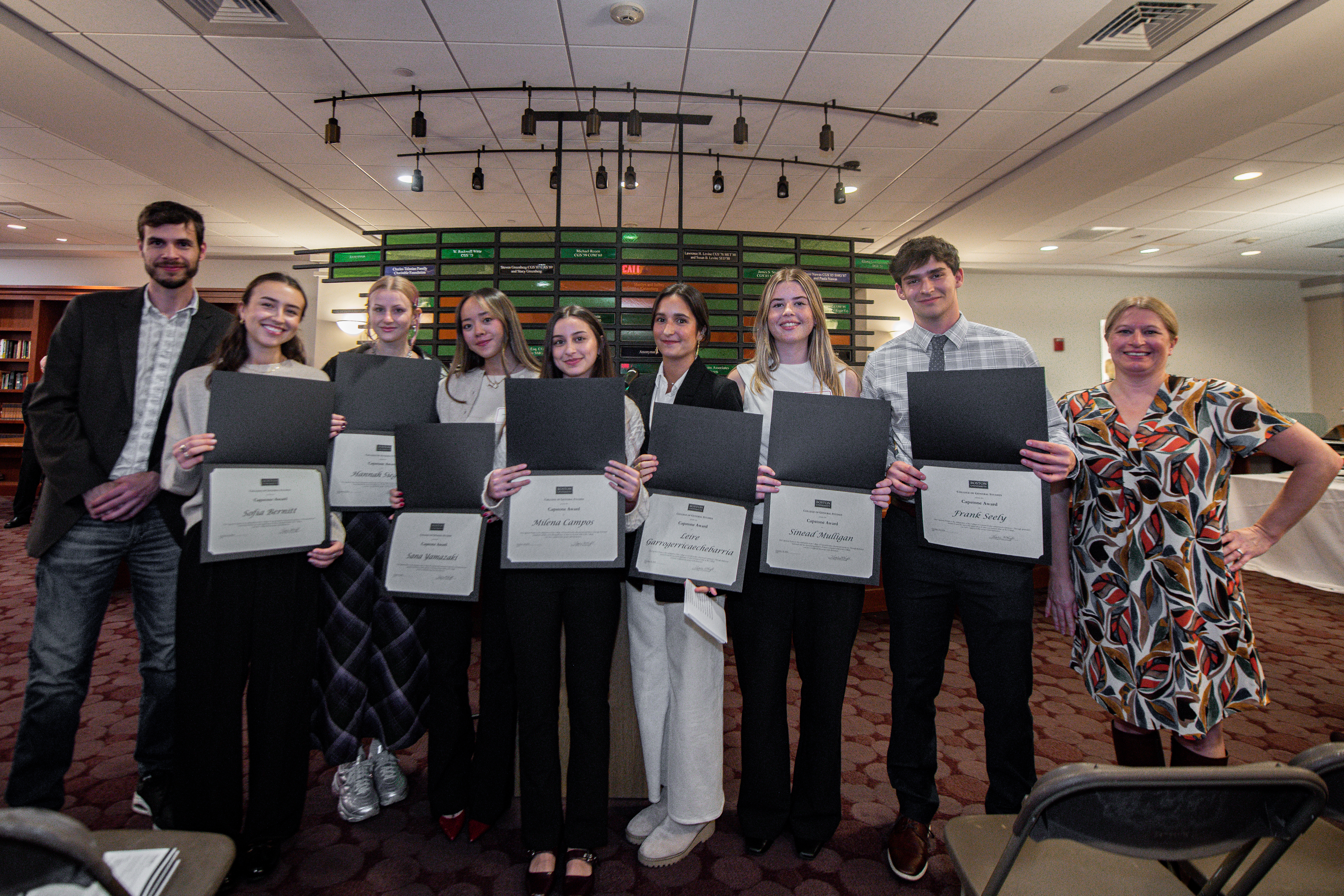
The winning Capstone group for Team U (Sofia Bernitt, Milena Campos, Leire, Garrogerricaechebarria, Sinead Mulligan, Frank Seely, Hannah Siegrist, Sana Yamazaki) focused on how to effectively handle the opioid crisis—an urgent and harrowing issue facing many municipalities. The group identified themselves as a non-profit organization called the Compassion Care Collective, whose motto is “Progress Through Prevention.” They primarily focused on harm-reduction, to prevent further harm to people with substance use disorder in a compassionate, non-judgmental, and non-coercive manner. The group could have focused on any number of cities where opioid use is a problem—at the beginning, they concentrated on Philadelphia, but ultimately decided on Newark, New Jersey. They exhibited an exemplary understanding of Newark’s current political situation, as well as demographics and existing harm reduction programs. The group’s policy recommendation was twofold: first, to gain support from relevant stakeholders by conducting study tours of a successfully operating safe injection facility in New York City. Then, after gaining support, they proposed setting up a safe injection pilot program within an existing harm-reduction facility in Newark. In their proposal, the group recognized the importance of community support, and the importance of working with existing programs. Building off their strong final paper, their defense showcased a group deeply and universally familiar with the material in question.
Team V: Surveillance Policies as a Means for Pandemic Prevention and Monitoring
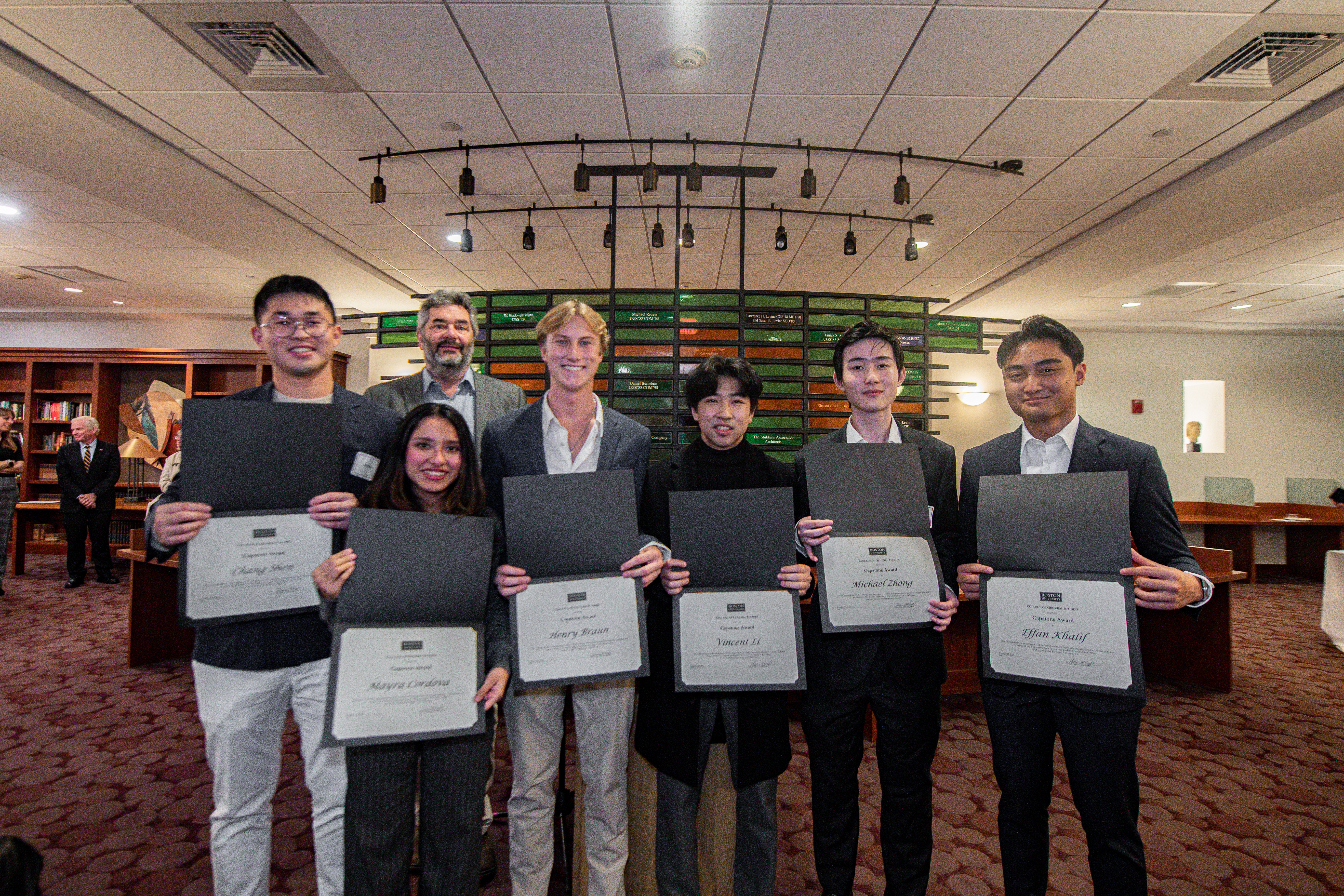
Team V’s Capstone winners (Henry Braun, Mayra Cordova, Effan Khalif, Taek Lee, Vincent Li, Chang Shen, Michael Zhong), operating under the principle that better knowledge leads to better decision making, ideated on steps to prevent another pandemic like COVID-19 in the future. They focused on improving the surveillance capabilities of society through wastewater testing. This way, people and policy makers can have almost instantaneous access to data about the presence of viruses in the community. This Capstone group also argued for the creation of a more comprehensive genomic database for viruses that are circulating in other species. No one has yet learned how to predict future pathways of virus evolution, but the creation of a virus database will help researchers and policy makers prepare for what may come next. In the absence of better wastewater surveillance and a global virus database, policy makers are left with the task of trying to find a solution without notion of the right direction in which to step. This is a difficult position in which to find oneself, but this Capstone group offered a solution, and presented an argument that was both clearly written and logical, with a great deal of supporting evidence.
Team W: High-Fructose Corn Syrup Addiction and Why Government Intervention is Necessary
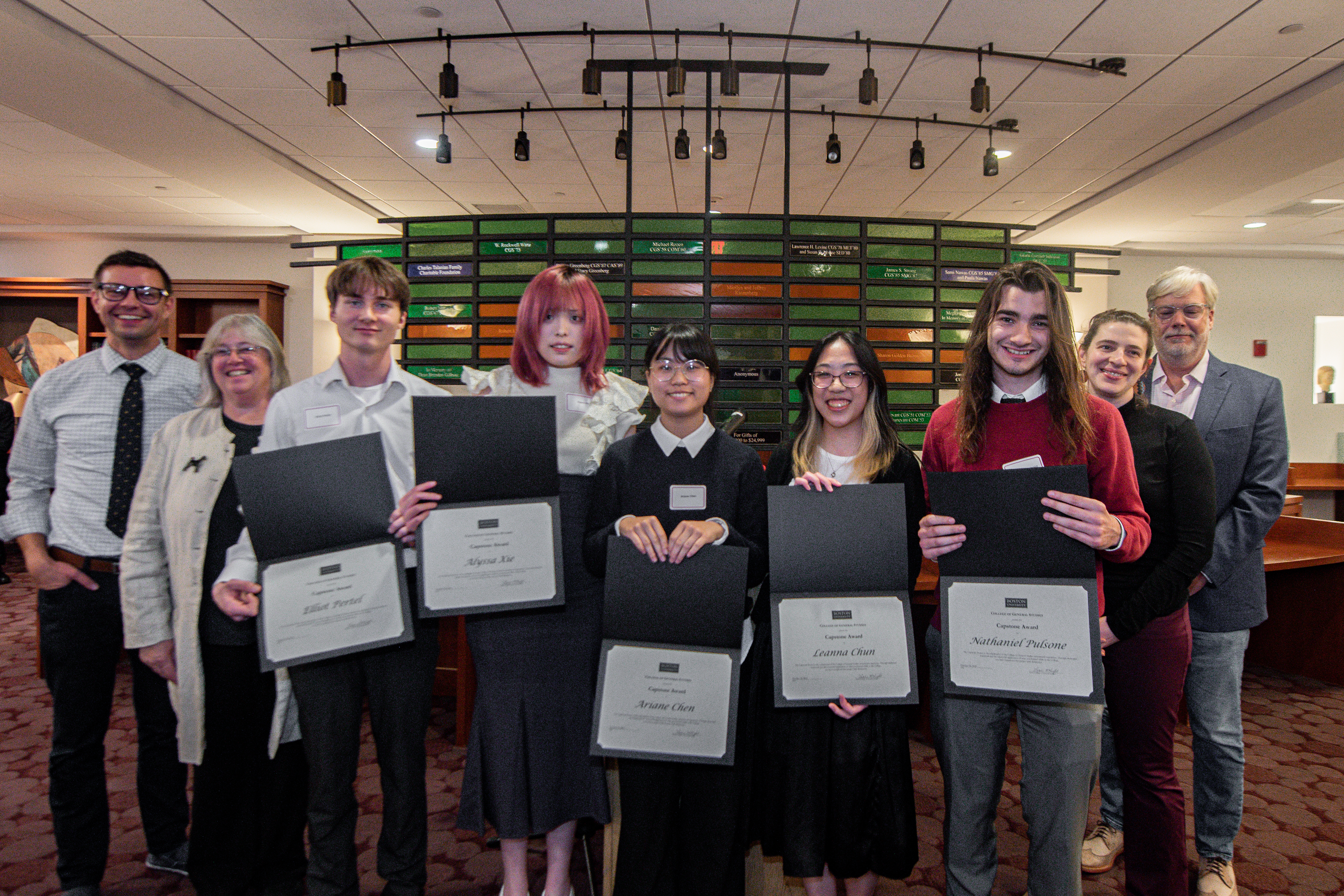
The winning Capstone group for Team W (Harrison Adler, Emem-Obong Akpabio, Ariane Chen, Leanna Chun, Elliot Pertel, Nathaniel Pulsone, Blanca Ramirez, Alyssa Xie) tackled the complex and controversial issue of high-fructose corn syrup (HFCS). They examined the negative health effects of high-fructose corn syrup, both physical and mental, as well as the important context of the problem rooted in agricultural economics. Their thoughtful solution to the problem, in the form of a bill proposal, involved regulation of HFCS content and conspicuous product labeling. In addition to high-quality research and writing, this Capstone project included a series of visual explainers—charts, illustrations, data representations, and the like—that added a great deal to the impact of the project. This group made a convincing case that HFCS addiction is a major public health threat, and they provided a realistic and well-constructed potential solution.
Team Y: A Proposal for The Integrated Tech Company Regulations Act of 2024
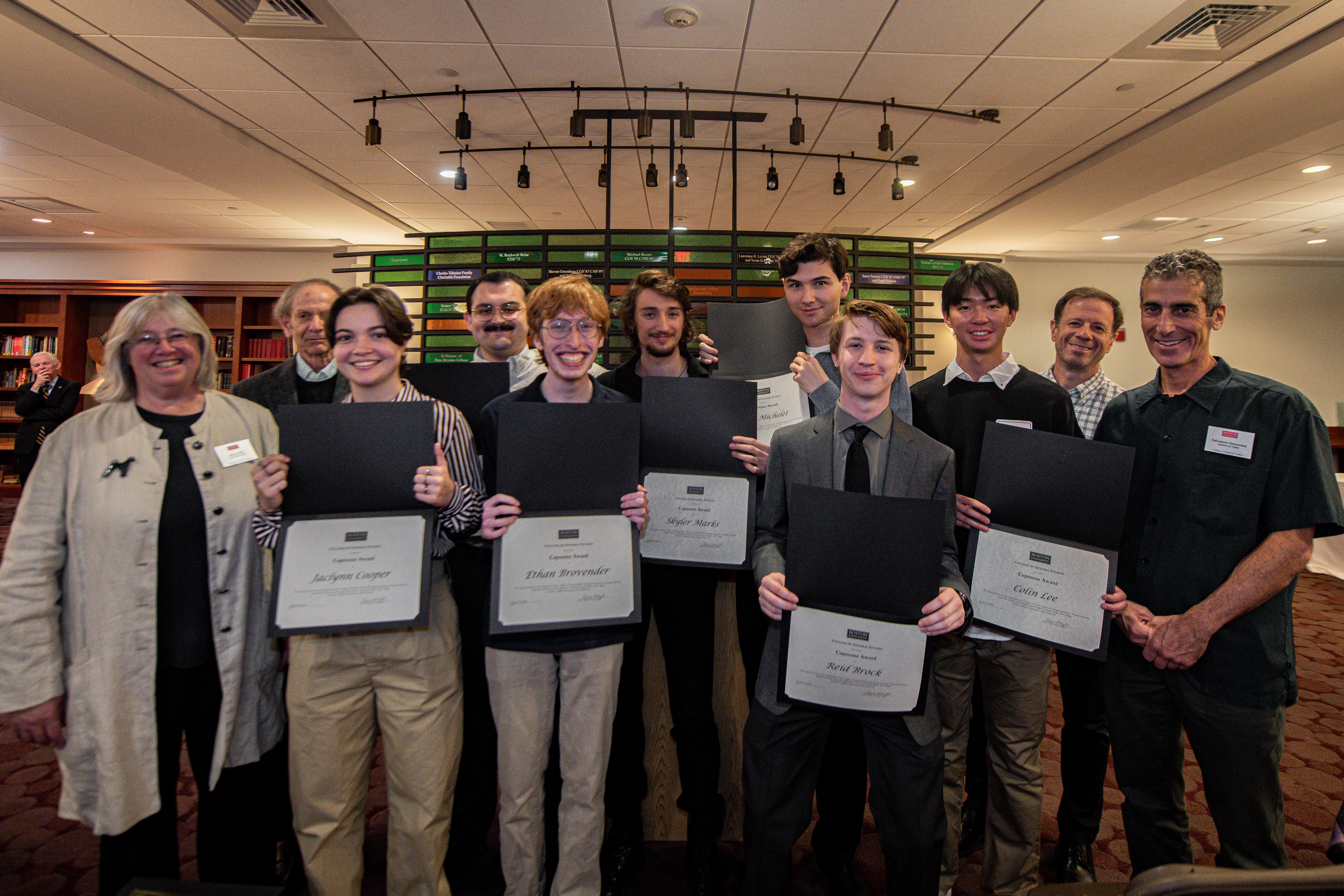
Team Y’s winning Capstone group (Reid Brock, Ethan Brovender, William Conroy, Jaclynn Cooper, John Fox, Colin Lee, Skyler Marks, Eren Michelet) focused on the out-sized power and monopolistic practices of the largest tech companies—a problem that Congress has struggled and consistently failed to address. The group’s research showed that government lawsuits aimed at reining in these behemoths take a long time and yield little achievement. They concluded that the anti-trust laws of the 19th and 20th centuries are simply inadequate to cope with the new digital economy. Taking on the role of legislative staffers steeped in anti-trust history and law, they devised a sophisticated, persuasive, plausible bill that could actually resolve the issue in a way that is both positive and constitutional.
—Compiled by Adriana Rivera, Photos by Ziyu Julian Zhu